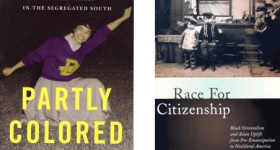I wanted to start with your creative process. What was your process to get Zero Bridge made? What was your intention when creating the film?
I
was interested in presenting the humanity of an important part of the
world. I don't have any agenda or any particular stake in the argument
about Kashmir. But my main interest was in putting a face on this large
gap in my understanding of a place I have heard a lot about. I have
visited Kashmir a lot, and spent time there with extended family. For a
long time, I kept a long running file of stories and things not
connected to actually making a film there, much less a cycle of films.
So, I took the material that I have been collecting for years, and from
that I developed situations and characters when I arrived in Srinagar.
What is your personal relationship with Kashmir? Have you spent a lot of time there?
Compared to someone living there, no. But compared to
Americans or most Indians, yes. Freud talks a lot about the uncanny.
The uncanny is that which is unsettling, haunting yet oddly familiar in
its unknowability. I didn't realize it, but I had been developing an
uncanny relationship with Kashmir because of my father's background,
and my experiences through extended trips. Every artist undertakes a
project in order to settle some kind of tension. But when I went to
Srinagar, I didn't go to make it all about me. You try to humble
yourself before the subject matter at hand, and you try to learn about
it as much as you can, invest in the specifics, and in getting the
details as right as you can. That is what I was doing while I was
there, trying to get the details right. So, using all the materials
I had, all the stories, was a way for me to open a door for people, so
they could see that I wasn't a tourist blowing in and out of Kashmir
for a time.
Let's talk about details of life in Srinagar and the way you capture them in Zero Bridge.
The scene where Dilawar is arrested by the police and thrown into the
rat hole is particularly compelling. The scene really shows us the way
authority works in Kashmir and the way that young men are running the
police station. How did you get close to that world?
It is impossible to not come into regular contact with the
police in Srinagar. Depending on the environment, most of the time it
is unfriendly, but occasionally, because the police are given beats to
cover, they start to know people by face, by place, by
the things they do, and the times they do them. After a certain time you get to
know people in an area. So I got to know a few people in my area, and I
would ask them things, spend time with them, have tea with them,
observe.
While watching the film, it takes a while to
decipher if it is a documentary or fictional film. I think it is one of
the strengths of the film.
Everyone who has seen the movie has said that they felt that
the camera is invisible. It makes me feel good, makes me feel like I
succeeded in what I was trying to do. The main thing I was interested
in, at the time I made the movie, were movies where the director didn't
draw attention to themselves. I just found myself feeling that so many
movies could have been better if it wasn't the director telling me,
"Look at me, I'm directing." I just felt that there were too many like
that. I was interested, considering this is my first feature and the
first time that Kashmir is being presented in a realistic, non-partisan
fashion, [in making sure] that it was of the essence to stay out of the
way, make my presence disappear...otherwise, I was going to look like a
jackass. So much of creative work is about ego suppression.
Let's talk about one scene on Nagin Lake. Dilawar is
speaking eloquently in such great English. For one moment, you believe
he could be somebody in the world. This guy obviously understands
Bani's quest for freedom, right? What was you motivation behind the
scene?
There were two. If the movie's stated goal is to show the daily
life in Srinagar city, you have to deal with tourism. It would be like
making a western film without horses. However, I knew he wasn't going
to be a tourist, so it made sense that he would have a part-time job,
which allowed me to work in a larger theme, which is the second thing.
I felt it important, in regards to his interest in being parochial, to
place him in the context of the world, encountering the rest of the
world. I wrote that scene, and had no idea of how to cast it. I thought
of acting it myself, but that wasn't going to work because I am a
terrible actor, and I don't look western enough.
It is a compelling scene. Dilawar's nose is amazing. The
big nose makes it difficult to see the rest of his face. The character
talks in restrained ways. He's a stunning character...
I have watched this movie in many countries, and everyone
mentions his nose. The Italians and Moroccans went nuts about the nose.
He looks like a young Adrien Brody, said one reporter.
What are you currently working on?
I am working
on something for television. I was commissioned by Time, Inc. studios
to develop a miniseries about the origins, rise and decline of J. Edgar
Hoover's FBI. I have been researching it and writing it for the past 15
months. Intermittently, as I wait for reviews and notes, I am writing
my next films.
___________
Zero Bridge screened at the 3rd I South Asian Film Festival on
Sunday, November 8 at 4:15 pm at the Castro Theatre in San Francisco. The screening was followed by an in-person Q & A with Tariq Tapa facilitated by
Robin Sukhadia.
Bridge has been nominated for a 2009 Gotham
Award, and will screen **twice** later this month for its
New York premiere at the Museum
of Modern Art (MoMA). Tickets are available
for:
__________________
Robin Sukhadia
Mr. Hyphen 2006/2007









Comments